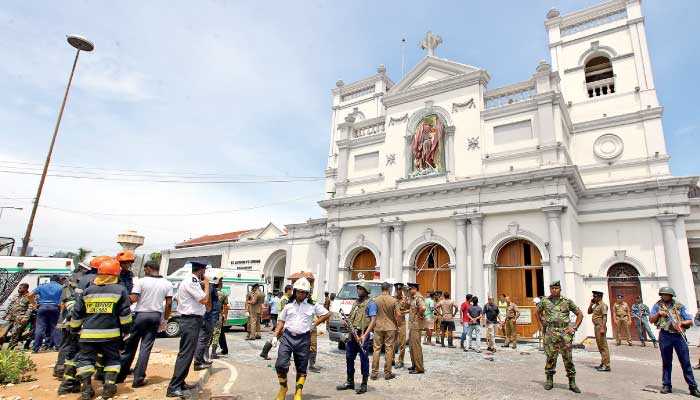Saturday Feb 14, 2026
Saturday Feb 14, 2026
Friday, 26 April 2019 00:20 - - {{hitsCtrl.values.hits}}


It was the best of times; it was the worst of times. Best because Sri Lanka was united in what it did well: being at peace, on an extended sabbatical, pursuing the absence of conflict – even mindlessly – and enjoying the fruit of island life. Worst because swiftly, sharply, suddenly, a mindful – as far as anyone brainwashed can be mindful – force, inimical to both happiness and holiness, proved to us all that in the midst of such a life we are in death.
As islanders from all walks of life and pilgrimages of faith now struggle to piece their lives together and live in peace together, several dominant themes (at least to my mind) emerge:
Controlled explosions
As forensic evidence is sifted, it becomes increasingly clear that the diabolical plot was a long time in the making. And despite the asinine assertions of state ministers, there is little to link the Easter Sunday attacks in Sri Lanka  with the carnage in Christchurch more than a month ago. That is the opinion evidently shared by New Zealand’s Prime Minister Jacinda Ardern, whose salutary leadership in the aftermath of her nation’s tragedy resulted in a great deal of good coming out of the grief.
with the carnage in Christchurch more than a month ago. That is the opinion evidently shared by New Zealand’s Prime Minister Jacinda Ardern, whose salutary leadership in the aftermath of her nation’s tragedy resulted in a great deal of good coming out of the grief.
A ‘controlled explosion’ (to borrow a phrase from bomb-disposal terminology) that could work well for Sri Lanka came from Field Marshal Sarath Fonseka in the House two days ago. In an obviously emotional yet tactically focused speech, the former Army Commander spoke truth to power in a way that had both foes and friends cringing, and running for cover. If the UNP, for one, is able to swallow its wounded pride and field this long-neglected soldier in forthcoming electoral battles, it may eventuate that while politicians may have forgotten the services of an erstwhile patriot – the people at large have not.
Be that as it may, the retired soldier turned would-be statesman’s calibre is a consummation devoutly to be wished among national leaders today.
Crucifying expositions
In a tattoo of uncontrolled explosions, our so-called national leadership has satisfied its bloodlust by firing embarrassing volley after volley of blaming shots across the well of a House as usual torn in two. The President, away from the scene of a home tragedy when it happened, lingered longer than it was conscionable and returned too late to deliver little by way of comfort, stimulation or encouragement. That the Prime Minister and his Cabinet were capable of no better comes as no surprise these days, as the principal party in Government continues its slide from the supercilious into the ridiculous. A call for the Defence Secretary and the IGP to resign could well be justified politically, for heads have to roll to satisfy public ire and political ambition alike.
Maybe if the man in the street was more willing to interpret what transpired as less of a lapse of intelligence than a hernia in common sense, we would not have to deal with women suicide bombers and dead children in shallow graves again. However smart or savvy our political mandarins may be after the event, calling for a spate of resignations when it is clear that the rot starts at the top makes one feel – a week after Good Friday – that three more crucifixions of the highest order would be welcome.
Calming exhortations
Much as it may hurt some to bring religion into the rich mix, credit for pouring balm on grievous wounds must go to Malcolm Cardinal Ranjith. In the later aftermath of the deadly attacks which left large numbers of his flock dead and church property damaged, the prelate – notwithstanding early shots fired in the heat of the moment – spoke the peace of Christ into a combustible situation.
And if even notoriously politically-minded clerics are sensitive to the need to calm not only the wounded body of Christ but hurting people from the length and breadth of our land with promise once, more sympathy and mutual understanding among diverse communities may plant some much needed seeds of reconciliation.
Be that too as it may, there is much more to be done starting from the grassroots level up to cultivate a tree in which the crippled birds of a once-blessed isle can take shelter and refuge from what seems like a coming storm long in the making.
Civilian explosives
I wrote yesterday and retweeted several times in the past few days about the remarkable restraint that a majority of islanders showed to their fellow citizens in the wake of the incendiary attacks. But today, I’m saddened to see less salutary accounts popping up through the cracks in our national psyche’s chinks. Sorry to read in New York Times World’s Twitter feed inter alia “In Negombo … gangs of Christian men moved from house to house, smashing windows, breaking doors, dragging people into the streets, punching them in the face and threatening to kill them.” True? False? Rumours? The jury is out, and personal and propaganda wars on Twitter – the only social medium available to armchair warriors no less fierce than radicalised anarchists – rage…
However hard it is to hear these horror stories, they must be told – Not to alarm or aggravate. But alert and make aware. And in order that human emotion not add fuel to the flames of institutional failure. However, for a plethora of such explosive reports there is a panoply of rewarding encouragements. Not least of which for me personally was an unsolicited visit by my Muslim neighbours a day after dark Easter. Whether in sympathy, solidarity or a show of reciprocation for support extended when the Kandy District was set alight by inflamed arsonists, I neither know nor care to ask.
Therefore in the midst of the pain, grief, carnage, and in true island spirit, it seems my neighbours are keen to build. Negombo may be an aberration for a community notoriously temperamental. But in the main, the ‘cardinal’ principle (take it as you like it) of “forgive them, for they do not truly understand what they are doing” holds true in the land today. And if the cold clear darkness after the political purges has any light in it at all, it is that for a majority of Sri Lankans, this peace without present justice – warts and all – is well worth preserving.
I pray that neither craven self-serving politics nor the volatile passions of secularised religion will compromise a people who are crying out “Come, let us build!”
There is a fifth horseman of our apocalypse (Greek, ‘revelation’). An uncovering that starts by asking, “Who benefits?” (Cui bono, in Latin…)
Cui bono examination
I hesitate to suggest that anyone benefits in any sense from the senseless deaths Sri Lankans as a whole suffered with the toll still rising and with personal costs being inestimable. But it seems that someone, somewhere, had a purpose in creating this chaos. Shall we pussyfoot around every sensitive islander’s sneaking suspicion that a sometime State-empowered terrorist has somehow a hand in it?
However hard that may be to stomach, the bitter pill is that politicos of all stripes are seeking to score cheap points and striving to get ahead of their fellows in a terrible rat race to first place. Therefore, whoever the fanatic mastermind/s may be behind the egregious violence, self-serving politicians of all parties can and must be held accountable for their lapses and lack of accountability up to now.
We could start by signing as many citizen petitions as possible to bring an impeachment motion to bear on our Head of State: who is clearly unfit to be a decent man leave alone Defence Minister. The State Defence Minister and his political senior the Prime Minister stand condemned out of their own mouths for a lack of significant enough political will to insinuate themselves into the crucial National Security Council or agitate sufficiently so that the Governmental apparatus was alerted in time to their critical omission from that vital council.
That other defence mandarins like secretaries, inspectors general or intelligence chiefs are axed or asked to resign is neither here nor there to me. There is such a thing as natural justice, true. But Cabinet responsibility is a custom honoured more in the breach than the observance – and it would surprise everyone if ministers, MPs or major military officials said so much more than a token ‘mea culpa’! Shall we not do better to take radical steps to investigate the governors implicated in promoting and protecting the culprits and suspects?
The faith – or lack of it – of a citizen is a private matter between him or her and their deity or demon. There are times, though, when the body politic and its elected or appointed executives does well – and does right – to ask the man to drop his mask and face his public interrogators; preferably sans political shield and buckler. This is such a time; and there are at least two provincial governors who need to give account of their past and present doings.
(Journalist | Editor-at-large of LMD | Writer #SpeakingTruthToPower)